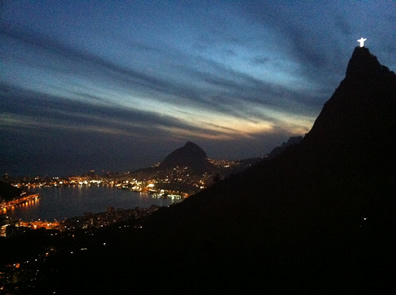
Highlights of the last tour in 2012 included concerts in the beautifully restored Salão Leopoldo Miguez in Rio de Janeiro and for the prestigious Cultura Artistica series in São Paulo. This was followed by an inspiring visit to the Baccarelli Institute in the Heliopolis favela in São Paulo, where we gave classes to highly-talented students, many of whom are using their musical training to escape a life of extreme poverty.
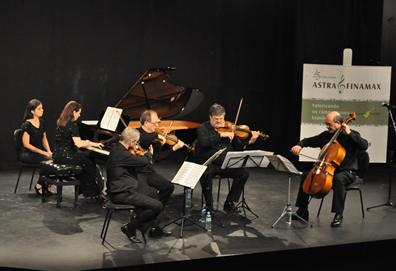 We also gave concerts in the industrial city of Jundiaí as part of the innovative Astra Finamax series, for the autistic support charity Autismo & Realidade in São Paulo and in the northern city of Maceió in the delightful colonial-era Teatro Deodoro, which is one of the oldest surviving theatres in Brazil. The tour was supported by Santander Universities and organised by our friend and colleague, the Anglo-Brazilian pianist Clelia Iruzún, and we are now planning further events with her in Brazil and the UK to promote Anglo-Brazilian cultural ties. Having enjoyed wonderful hospitality throughout the tour, we are now enthusiastic converts to the delights of Brazilian cuisine, and an authentic and exhaustively-tested recipe for the famous ‘Caipirinha’ cocktail can be found below!
We also gave concerts in the industrial city of Jundiaí as part of the innovative Astra Finamax series, for the autistic support charity Autismo & Realidade in São Paulo and in the northern city of Maceió in the delightful colonial-era Teatro Deodoro, which is one of the oldest surviving theatres in Brazil. The tour was supported by Santander Universities and organised by our friend and colleague, the Anglo-Brazilian pianist Clelia Iruzún, and we are now planning further events with her in Brazil and the UK to promote Anglo-Brazilian cultural ties. Having enjoyed wonderful hospitality throughout the tour, we are now enthusiastic converts to the delights of Brazilian cuisine, and an authentic and exhaustively-tested recipe for the famous ‘Caipirinha’ cocktail can be found below!
Caipirinha Recipe
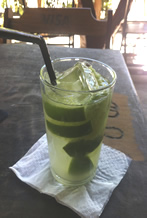 4 limes
4 limes
4 tbsp caster sugar
200 ml cachaça
2 large handful crushed ice
1. Cut the limes into wedges.
2. Add to a large jug with the sugar and crush to release the juices.
3. Add the cachaça and mix well, then divide between 2 tall glasses. Fill each glass with crushed ice
 Tour of China
Tour of China
Coull Quartet and Clelia Iruzun, October 2009
Philip Gallaway’s impressions
Although the Quartet has toured Asia in the past, our only previous visit to China was to Hong Kong while it was still under British rule, so when we were invited to tour this rapidly developing country with the brilliant Brazilian pianist Clelia Iruzun, we jumped at the chance. The tour was to be centred around Shanghai and Beijing, culminating in two concerts at Beijing University.
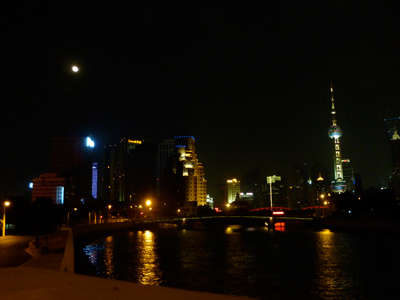 Shanghai is a city buzzing with excitement and energy, where even crossing a road can be a stressful experience (the best technique is to keep walking at a slow, steady speed, while the scooters, bikes and cars skilfully manage to avoid you). One would imagine that the pace of life here could cause high blood pressure, but a visit to one of the many public parks soon illustrates just how seriously the Chinese take personal fitness and relaxation.
Shanghai is a city buzzing with excitement and energy, where even crossing a road can be a stressful experience (the best technique is to keep walking at a slow, steady speed, while the scooters, bikes and cars skilfully manage to avoid you). One would imagine that the pace of life here could cause high blood pressure, but a visit to one of the many public parks soon illustrates just how seriously the Chinese take personal fitness and relaxation.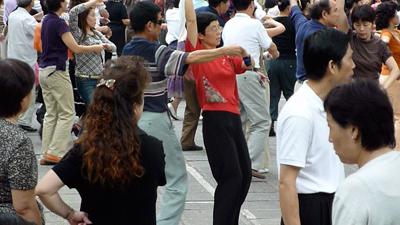 In Luxum park on a Wednesday morning, I saw many people jogging and practising Thai Chi, but more remarkable was the sight of dozens of elderly couples happily dancing together, ad hoc groups of singers in full voice, and a variety of instrumentalists playing soulful music (purely for their own enjoyment, not busking for money). Everyone seemed totally unconcerned by the fact that they were within earshot of each other. From our hotel, overlooking the park, there was a fascinating melange of all these sounds, mingling with the rhythmic beeping of car horns.
In Luxum park on a Wednesday morning, I saw many people jogging and practising Thai Chi, but more remarkable was the sight of dozens of elderly couples happily dancing together, ad hoc groups of singers in full voice, and a variety of instrumentalists playing soulful music (purely for their own enjoyment, not busking for money). Everyone seemed totally unconcerned by the fact that they were within earshot of each other. From our hotel, overlooking the park, there was a fascinating melange of all these sounds, mingling with the rhythmic beeping of car horns.
Our concert programme throughout the tour consisted of quartets by Mozart and Britten, piano music by Mendelssohn, Schumann's piano quintet, and a movement of the Yellow River concerto, which we had been asked to include by our Chinese agent, Xue Mei. In one concert, (where we had considerable competition from mobile phones), as soon as we began playing this popular Chinese work the audience erupted into spontaneous applause, reminiscent of the Viennese audience on New Year's Day at the opening of the Blue Danube. Mobile phones apart, the audiences, which included all age groups, listened intently throughout and were highly appreciative. At the end of one concert we were surprised when the audience stopped clapping almost before we had left the stage. We were in the wings packing everything away when we heard enthusiastic applause starting up again, so we hastily retrieved our instruments and returned to give an encore.
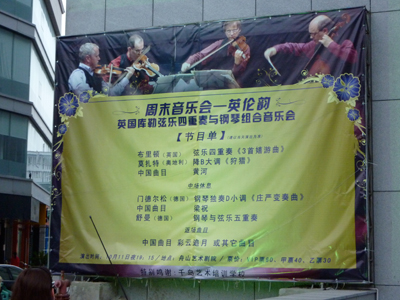 The concert halls were all modern with good facilities, examples of the recent modernisation and development which was apparent wherever we went - new railway flyovers and motorways under construction, state-of-the-art metro systems, and of course, the impressive Shanghai Maglev train, capable of speeds up to 430 kph.
The concert halls were all modern with good facilities, examples of the recent modernisation and development which was apparent wherever we went - new railway flyovers and motorways under construction, state-of-the-art metro systems, and of course, the impressive Shanghai Maglev train, capable of speeds up to 430 kph.
Beijing, said to have an area of over 16,000 square kms, presented us with some logistical problems, particularly as our hotel was some way out of the centre. Every journey seemed long and slow, not helped by the heavy security everywhere due to President Putin's presence that week. We were, however, fortunate enough to have some free time there, enabling us to visit the Great Wall and the Forbidden City.
Coull Quartet tour of Germany and Poland - April 2-13
On April 10th the Coull Quartet performed in Berlin in the beautiful Heilig-Geist-Kapelle, the city’s oldest church. Invited by the departments of British Studies and Economic History at Humboldt University, the first half of their concert was a tribute to Benjamin Britten, who was born one hundred years ago; Tchaikovsky’s highly emotional 3rd Quartet completed the programme. Before the concert, Professor Nicholas Crafts, from the University of Warwick, gave a talk on the subject of Britain in the European Economy.
The Coull Quartet’s first trip to Berlin was in 1990 – when the infamous Wall was still largely intact, but no longer serving any purpose other than for providing tourists with small chunks of graffiti-covered concrete! They remember the stark contrast between East and West – the acrid smell of the two-stroke engines of the famous ‘Trabi’ cars, and the grey, deserted streets of the East, which seemed to inhabit a different era from the opulence the West, with its busy, modern shops and restaurants. Now the whole city is exciting and thriving, and the only remaining section of the Wall has become a vibrant art gallery.
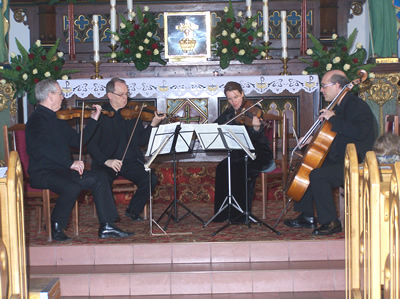
 Whilst in Poland the performers stayed at the Reconciliation Centre in Kreisau, the small Polish town where the so-called Kreisau Circle was established in the 1930s. This 20–strong group of eminent figures was determined to remove Hitler from power, but their efforts only led to an unsuccessful assassination attempt on his life in 1944, resulting in the execution of the group’s leader.
Whilst in Poland the performers stayed at the Reconciliation Centre in Kreisau, the small Polish town where the so-called Kreisau Circle was established in the 1930s. This 20–strong group of eminent figures was determined to remove Hitler from power, but their efforts only led to an unsuccessful assassination attempt on his life in 1944, resulting in the execution of the group’s leader.
The combination of such reminders of these darkest moments from European history, the friendship and warmth of the excellent choir from Berlin, and the enthusiasm of the audiences in Berlin and Poland, all added up to make this an event which will remain in the Coull’s memory for years to come.
